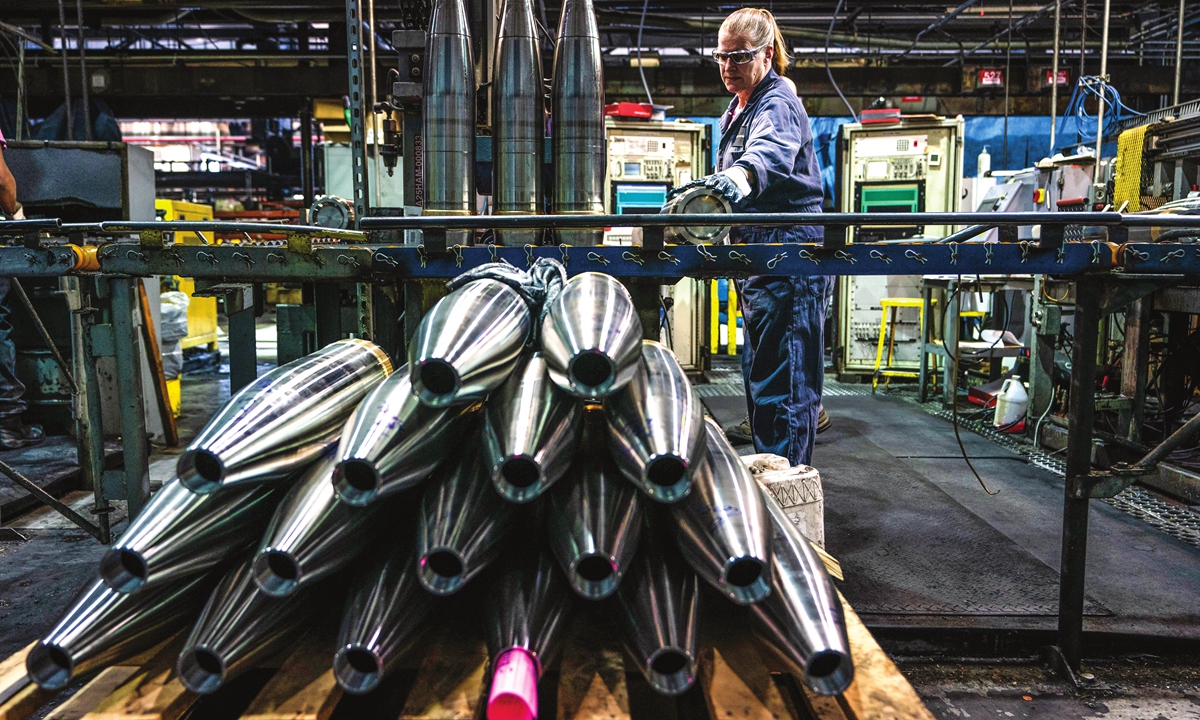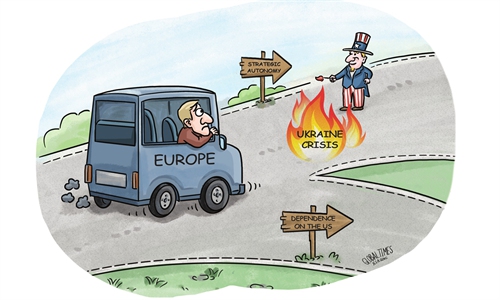IN-DEPTH / IN-DEPTH
How US military, tech firms profit from Russia-Ukraine conflict by turning it into an ‘AI warfare’ testing ground

Photo: VCG
The Russia-Ukraine conflict, having gone on for 17 months, seems to show no sign of letting up in a short time. Last month, a Bloomberg story shared how a 23-year-old US entrepreneur, Blake Resnick, made money through donations, and by selling his drones to Ukraine, thereby ballooning his net worth to more than $100 million.Ukraine "has become a proving ground for startups looking to showcase their latest technologies," commented the story titled Newly rich US defense tech titans seek fresh fortunes in Ukraine.
Mykhailo Fedorov, Ukraine's Minister of Digital Transformation, called Ukraine's conflict with Russia a "technology war" during a media interview in April. For the military and intelligence outfits and AI (artificial intelligence) companies in the US and its Western allies, the current situation in Ukraine not only provides a stage for their political stunts under the guise of "humanitarianism," but also provides a fertile testing ground for electronic warfare weapons, and an avenue for profiteering.
Worryingly, their "participation" may create big challenges for Ukraine's national security and sovereignty integrity, military and technology experts warned.
With military forces and tech enterprises from the US and its allies highly involved in this conflict in the name of "supporting Ukraine," information from some of Ukraine's key areas including national defense and information networks is likely to be leaked and infiltrated, which may be a recipe for disaster for the country, Chinese military observer Wang Qiang told the Global Times.
'A lab for AI warfare'
The Russia-Ukraine crisis has transformed into a fertile testing ground for the excited military, intelligence, and defense industry giants in the US and its allies, with observers having found that numerous tech weapons and AI support systems have continuously been transported to Ukraine for use in combat, such as drones, autonomous ships, unmanned vehicles, loitering munitions, and communication and geospatial intelligence systems.
The US Defense Department stated in May 2022 that it would send $150 million of electronic jamming equipment to the frontlines in Ukraine, reported US military publication C4ISRNET on May 9, 2022.
In April that year, the Pentagon announced a potential $300-million batch of aid to Ukraine that would include communications systems and similar gear, the C4ISRNET article added.
The Russia-Ukraine conflict "is a major stepping stone toward the networked battlefield and the AI wars of the future," read the article Ukraine A Living Lab for AI Warfare, which was published in the National Defense magazine in March.
The article's co-authors were retired US major general Robin Fontes, who served as the deputy commanding general of operations at Army Cyber Command, and Jorrit Kamminga of RAIN, a knowledge platform on the intersection of defense and AI.
They stated that the conflict is "a center-stage, relentless, and unprecedented effort to fine-tune, adapt, and improve AI-enabled or AI-enhanced systems for immediate deployment."
"That effort is paving the way for AI warfare in the future," they noted.
In the early days of the conflict, the US National Geospatial-Intelligence Agency reportedly sent five lightweight, high-resolution surveillance drones to the US Special Operations Command in Europe, just in case they might come in handy in Ukraine.
"The drones…weren't part of a so-called program of record at the Defense Department, hinting at the experimental nature of the conflict," read a CNN article on January 15.
The Russia-Ukraine conflict provides a comprehensive test for the military application of modern tech like AI, said Song Zhongping, a Chinese military expert and TV commentator.
AI has been widely used in the fields of reconnaissance, intelligence gathering, target detection, and anti-electromagnetic interference, and has been applied to lots of unmanned equipment, Song said. "It's no wonder that the US tests its AI weapons and tech through supporting Ukraine in the military conflict," he told the Global Times.
"Although the US claims that it won't get directly involved, it has actually prolonged the conflict by sending a lot of new equipment to the battlefield," noted Song.
And the US never hides its purpose of utilizing the battlefield as an equipment testing ground and reconnaissance point against Russia. Referring to the lessons learned, Jim Himes, a member of the House Intelligence Committee, said that "there's a book to be written about this," according to CNN. "Everything we are seeing in Ukraine… almost certainly represents the types of threats we will see," C4ISRNET quoted lieutenant general Maria Gervais as saying in August 2022.
Obviously, by gaining practical experience in Ukraine, the US intends to utilize the data gathered, and prepare to deploy the tested technology in possible future battlefields against its major "adversaries," such as Russia and China, Song pointed out.

A steel worker works at the Scranton Army Ammunition Plant in Scranton, Pennsylvania on April 13 2023. One of the most important munitions of the Ukraine conflict comes from a historic factory in this city. Photo: VCG
Controversial involvement
To some Western tech companies, the Russia-Ukraine conflict is not only a shortcut to profit but also a good testing ground for new AI technologies and products.
The longevity of the conflict allows companies to fine-tune, adapt, and improve their AI systems on the go, according to an article titled Ukraine A Living Lab for AI Warfare.
Therefore, it's not surprising to see "the unprecedented willingness" of foreign companies, such as those in the geospatial intelligence field, to assist Ukraine "by using AI-enhanced systems to convert satellite imagery into intelligence, surveillance, and reconnaissance advantages," the article noted, adding that "US companies play a leading role in this."
Many US tech enterprises, including Palantir Technologies, Planet Labs, BlackSky Technology, and Maxar Technologies have provided AI-based systems to analyze trends in the conflict, or produce satellite imagery about it.
Palantir Technologies, for instance, was responsible for targeting technologies used by Ukrainian forces in such weaponry as tanks and artillery, said CEO Alex Karp.
"…militaries without advanced targeting capabilities and algorithms are handicapped in modern warfare," Karp claimed at the Responsible AI in the Military Domain (REAIM) event in February.
Getting involved in the Russia-Ukraine conflict has obviously made companies like Palantir Technologies huge profits. After Karp became the first Western CEO to visit Ukrainian President Volodymyr Zelenskyy on Ukrainian soil in June 2022, and announced that Palantir and the Ukrainian government had struck a deal, its shares reportedly jumped by 10 percent within a day. Three months later, the stock had skyrocketed by 75 percent, according to an article published on stock analysis website VectorVest in May.
However, as the US' tech companies eagerly enter the Russia-Ukraine conflict, controversies have emerged regarding their AI technologies infringing on human rights and privacy.
The US facial recognition surveillance company Clearview AI, for instance, has provided free access to Ukrainian investigators to identify the dead who perished in the war - both Russians and Ukrainians. The Ukrainian investigators then brutally and directly inform families in Russia that their children have been killed in the war.
The New York-based start-up bills itself as having "the world's largest face network" with billions of mugshots from the internet - many of them scraped from social media sites like Facebook - data which it later sells.
Founded in 2017, Clearview AI had raised over $38 million and was valued at $130 million as of 2021. However, the software company has already been the target of multiple class-action lawsuits and joint investigations in states such as Illinois in the US, as well as in the UK and Australia, for allegedly using facial recognition data without user consent.
Faced with the deployment of Clearview AI on the battlefield in Ukraine with little resistance, the New York Times cites critics' warnings that such tech companies may be exploiting a crisis to expand with little privacy regulation, and that any mistakes made by the software or its users could have dire consequences in the war zone.

A Ukrainian soldier looks on via Facetime as an airman gives him a tour of a C-17 Globemaster III flight deck at Joint Base Charleston, South Carolina on February 22, 2023. Photo: VCG
Hidden dangers to Ukraine
As technology companies shape the Russia-Ukraine conflict and claim to want to help Ukraine rebuild, these companies may "control" the most critical parts of the country - from infrastructure such as the internet to national defense in the form of satellite images, warned Scientific American, a US-based science magazine.
In the face of the Russia-Ukraine conflict, the US has never truly considered the national security of Ukraine and the security of its citizens' information, but rather coldly and selfishly used Ukraine as a NATO antecedent artificial testing ground from the perspective of technological evolution, Wang noted.
"From identifying and locating targets for attack on the frontlines of war, to big data analysis of popular sentiment feedback for better opinion mobilization, for the US, this testing ground is all-encompassing," Wang said.
Wang also pointed out the US might even attempt to dismember Europe through Ukraine in the future. "The US has called for the construction of such so-called joint information infrastructure network facilities, and then empowered with advance technologies, especially AI technology and big data, NATO's information warfare capabilities are enhanced, but also the US' ability to control NATO-sourced information," he said.
According to the New York Times, as early as 2021, there were more than 1,800 US law enforcement agencies that had used Clearview's product, including the Secret Service, the FBI, and other federal agencies.
Currently, whoever can seize the first opportunity to deploy AI means the party that gets to enjoy large but nearly unexplored market, which fuels the need to maintain hegemonic control by countless capitalists and countries, Wang said.
The Biden administration has stated that AI poses a threat to public safety and democracy but the government has limited authority to regulate it.
The core of US hegemony is placing itself above the security of other countries. Now, the US believes that it can do this through absolute technological leadership, so it uses all kinds of means and even appeasement to achieve such a monopoly.
But such a monopoly will eventually bring infinite evil consequences to the US itself, according to Song.


